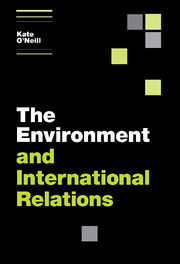Book contents
- Frontmatter
- Contents
- Preface
- Acknowledgements
- List of commonly used abbreviations
- 1 Introduction: The environment and international relations
- 2 International environmental problems
- 3 Actors in international environmental politics
- 4 State-led global environmental governance: International cooperation and regime formation
- 5 The impacts and effectiveness of environmental treaty regimes
- 6 Global economic governance and the environment
- 7 Non-state global environmental governance
- 8 Conclusions: The environment and international relations in the twenty-first century
- References
- Index
- References
6 - Global economic governance and the environment
Published online by Cambridge University Press: 05 June 2012
- Frontmatter
- Contents
- Preface
- Acknowledgements
- List of commonly used abbreviations
- 1 Introduction: The environment and international relations
- 2 International environmental problems
- 3 Actors in international environmental politics
- 4 State-led global environmental governance: International cooperation and regime formation
- 5 The impacts and effectiveness of environmental treaty regimes
- 6 Global economic governance and the environment
- 7 Non-state global environmental governance
- 8 Conclusions: The environment and international relations in the twenty-first century
- References
- Index
- References
Summary
The relationship between economic globalization and the environment has engendered much debate across the fields of economics, sociology, international relations, international law, and other social science disciplines allied with international environmental politics (e.g. Clapp and Dauvergne 2005). Is economic globalization, and the political structures that support it, intrinsically bad for the global environment? Is it, as some argue, a net positive for the environment, as the additional wealth generated by globalization is channeled into environmental protection and technological innovation? Or, is globalization compatible with a sustainable future as long as we build in institutions and processes that enable environmental – and social – protections? As Clapp and Dauvergne point out, there is no definitive answer to these questions. However, they continue to inform how scholars, activists, and policymakers address the ways in which the global economic order intersects with global environmental politics.
In this chapter, we focus on the three main international economic governance institutions: the World Trade Organization (WTO), the World Bank, and the International Monetary Fund (IMF), sometimes known collectively as the Bretton Woods institutions, after the 1944 conference where they were founded. As the main international organizations governing trade, finance, and development assistance, they have been critical in defining the path of economic globalization in the decades since World War Two. More recently, however, they have become focal points for critics of the environmental and social impacts of globalization.
- Type
- Chapter
- Information
- The Environment and International Relations , pp. 135 - 166Publisher: Cambridge University PressPrint publication year: 2009
References
- 1
- Cited by

